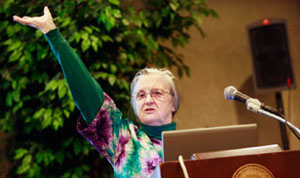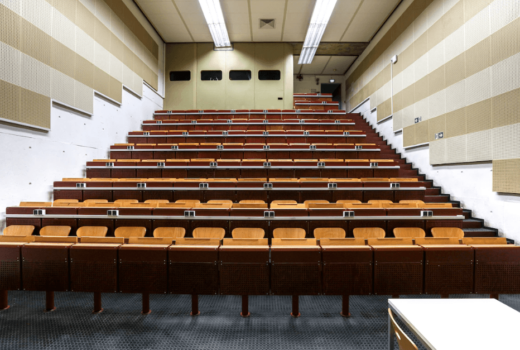‘Life has changed’

In het interview door medewerker Adam Smith van hetNobelcomite kan de winnares het natuurlijk om te beginnen nietnalaten hem te plagen met zo’n naam!
AS] Hello, my name is Adam Smith. I’m calling from the NobelFoundation’s official website, in Stockholm.
[EO] Yes. Adam Smith, what a name! I’m sorry, you’re kidded alot, I’m sure.
[AS] Exactly, and I think sometimes the new Economics Laureatesthink I’m a hoax caller when I do this. We have a tradition ofrecording very short telephone interviews for the Nobel Foundationwebsite, with the new Laureates, so would you mind speaking for afew minutes?
[EO] Ah, yes, fine.
[AS] Thank you very much indeed. Of course, congratulations onthe award.
[EO] Well, it’s an unbelievable honor, yes.
[AS] You, as I know has just been pointed out on the PressConference, are the first woman in the forty year history of theSveriges Riksbank Prize in Economic Sciences to be awarded. Doesthat make it a greater honor?
[EO] Yes. Having lived through an era, where I was thinking ofgoing to graduate school and was strongly discouraged because Iwould never be able to do anything but teach in a city college …Ah ha ha, life has changed!
[AS] Do you think that the ratio of Laureates in EconomicSciences – the gender ratio – is it in any way representative ofthe ratio of people working in the subject now or has it reallychanged?
[EO] It’s slowly changed. I’ve attended economic sessions whereI’ve been the only woman in the room, but that is slowly changingand I think there’s a greater respect now that women can make amajor contribution. And I would hope that the recognition here ishelping that along.
[AS] I imagine it sends a strong signal, yes. Now, you work onthe management of common property by common ownership contrastingit with the effects …
[EO] Among other things, yes.
[AS] Would it be true to say that, broadly, you’ve found thatcommon ownership can be more effective than people thought it mightbe?
[EO] Yes! It’s not a panacea but much more effective than ourcommon understanding.
[AS] And, is there one example you’d like to give of where thisis so?
[EO] Well, let me use the example of lobster fisherman in thestate of Maine. In the 1920s, they almost destroyed the lobsterfishery. They regrouped and thought hard about what to do and overtime developed a series of ingenious rules and ways of monitoringthat have meant that the lobster fishery in Maine is among the mostsuccessful in the world. The big threat that comes now is that theother fisheries around it have so over-fished fish, that thelobster is a little bit of an extreme example of … If there werean illness or something that came, a bug, that infected them, theywould be very exposed. But they have been incredibly effectivethrough the years.
There are many other small to medium sized groups that havetaken on the responsibility for organizing resource governance.We’ve studied several hundred irrigation systems in Nepal. And,farmer-managed irrigation systems are more effective in terms ofgetting water to the tail end, higher productivity, lower cost,than the fancy irrigation systems built with the help of AsianDevelopment Bank, World Bank, USAID, etc.
So, what we have is many local groups are very effective, butthat it’s not universal. So we can’t just now be naïve and think,’Oh, well, just leave it to the people, they will always organize.’There are many settings that discourage self-organization
[AS] Right.
[EO] And, thus, we must understand both the conditions – thatthey can, but the conditions under which they will.
[AS] Well, I was going to ask you whether your research has alsoshed light on the conditions that lead to good self-organization.Are there particular features that have to be in place, forinstance enough time for participants to work out what their set ofregulations should be?
[EO] Yeah, and I have an article in Science in July of this pastyear which lays out a broad diagnostic framework and identifies anumber of variables that are associated with self-organization.
[AS] Would you say broadly though that self-organization shouldbe used and trusted more than it is now? That society should movetowards trying to implement self-organizing structures?
[EO] Yes, but not with a formula. So there are many, manyefforts now to decentralize and they create a rigid formula andgive people rules from on top and say, ‘Now it’s yours.’ And thatisn’t worked very well either.
[AS] So, again, there’s a great deal of subtlety to it …
[EO] It’s this … yes. And, you think about the variety. If youlook at a countryside, think of the variety out there in terms ofthe ecological variety. Well, if people are going to manageecological variety, no single set of rules will work in a semi-aridversus a tropical-wet region. They have to be different.
[AS] Indeed. Another thing you’ve done is to conduct labexperiments …
[EO] Oh, yeah!
[AS] Which I believe have shown that people appear to be morewilling to enforce mutually agreed rules than had been expected,again.
[EO] Yes, we’re showing that. But we’re also showing a veryimportant role for face-to-face or even written communication. So,the prediction was that nobody would self-monitor because that’s asecond level social dilemma, if you go to Game Theory. But, whatwe’ve found is that people will, but it can be … people canescalate into, ‘I’ll punish you, you punish him, mamamamamma,’ andit gets worse and worse. So, with communication, where there’s anagreement on what is going to be the … what we are goingto do. The ‘we’ then being well-defined, then people can followrules, be cooperative and, occasionally, sanction one another tohelp that continue.
[AS] You mentioned Game Theory, there. How much of this isactually an extension of Game Theory and what we’re looking arerepeated games in developing these structures?
[EO] The … Game Theory has been very, very important in ourwork in that we’ve been able to take game-theoretic models and putthem in the lab and test them. And thus my early exposure in the1980s to the work of Reinhardt Selten, who is himself a NobelLaureate, was a very, very important step in my training.
Classical Game Theory is very predictive in some environmentsbut not fully predictive, by any manner/means, in an environmentwhich is a social dilemma. But very helpful for us in analyzing andas we develop a behavioral theory of humans and of other formalmechanisms we can explain why people do cooperate in some settingsand not others.
[AS] Right, yes. I’d like to finish just by asking whether youconsider that your work is economics or political science or socialscience, or maybe it doesn’t matter what it is, what it’sbranded?
[EO] I consider it to be political economy or the study ofsocial dilemmas. I was trained heavily in economics as anundergraduate. I studied with Armen Alchian and others, and thenworked with Reinhardt Selten in the 80s. I work with twocolleagues, economists, here in Bloomington that have been very,very important in my work. My husband worked with Charlie Tieboutand they developed a theory of metropolitan organization that wasan economic/political science overview, so the … I’ve crosseddisciplines, there’s just no question about it!
[AS] I suppose this award has the potential to catch the publicimagination, because the citation brands it as economic governanceand you’re talking about people getting involved in their owngovernance.
[EO] Yes!
[AS] It’s likely to be … it’s likely to spark people’simaginations and they’re going to …
[EO] I hope! Ha ha! That’s what I’ve been working on for all mylife! Humans have great capabilities and somehow we’ve had somesense that the officials had genetic capabilities that the rest ofus didn’t have.
[AS] Uh hum.
[EO] I hope we can change that.
Kennisland-voorzitter Joeri van den Steenhovengeeft een duiding van het werk van Ostrom als een van deoorspronkelijkste grondleggers van het nieuwe denken overkennisssamenlevingen: “Deze Nobelprijs is een mooie erkenningvoor Ostrom en voor hen die – bewust of onbewust – met haargedachtegoed werken aan een sterkekennissamenleving.”
‘Dat Elinor Ostrom als eerste vrouw en politicologe deNobelprijs voor Economie wint, is niet minder dan een doorbraak.Prachtig.
Ostrom heeft belangwekkend onderzoek gedaan naar de rol vaneindgebruikers en gemeenschappen in het beheren van collectievegoederen. Haar onderzoek richt zich vooral op duurzaamheid en hoemensen in gemeenschappen samenwerken om collectieve goederen alsbossen of visgronden te beheren. Zij toonde aan dat mensen langniet altijd voor eigen gewin gaan, maar voor collectief gewin,zolang er maar zo min mogelijk bemoeienis van bovenaf is. Zebestudeerde hoe zulke gemeenschappen functioneren. Met een vanhaar laatste boeken,
Ze betoogt daarbij dat kennis in dit digitale tijdperk moetworden opgevat als een ‘commons’, een gedeeld goed en complexecosysteem. Zij betoogde dat met het internet nu ookgebruikers heel goed in staat zijn om zelfstandig complexekennisgemeenschappen te ontwikkelen. En deze ook tegaan beheren. Denk bijvoorbeeld aan Wikipedia. Daarbijging zij in op het belang van de Open Access-bewegingen leverde ze een bijdrage aan de academische onderbouwinghiervan.
Maar ze keek ook naar de rol van open source software,onderzoeksbibliotheken en het intellectueel eigendom om kennis alscollectief goed te bewaken. Dat debat woedt momenteelwereldwijd. De 76-jarige Ostrom bewees daarmee eenvernieuwende econome te zijn, een van de grondleggers van deidee dat in deze tijd naast ‘de markt’ ook gemeenschappen vangebruikers een economische kracht zijn. Deze Nobelprijs is eenmooie erkenning voor Ostrom en voor al wie -bewust ofonbewust- met haar gedachtegoed werken aan een sterkekennissamenleving.’
Joeri van den Steenhoven is voorzitter van de stichtingNederland Kennisland
Meest Gelezen
Vrouwen houden universiteit draaiende, maar krijgen daarvoor geen waardering
Hbo-docent wil wel rolmodel zijn, maar niet eigen moreel kompas opdringen
Wederom intimidatie van journalisten door universiteit, nu in Delft
‘Waarom het nu niet lukt om medezeggenschap in hbo te versterken’
‘Sluijsmans et al. slaan de plank volledig mis’



